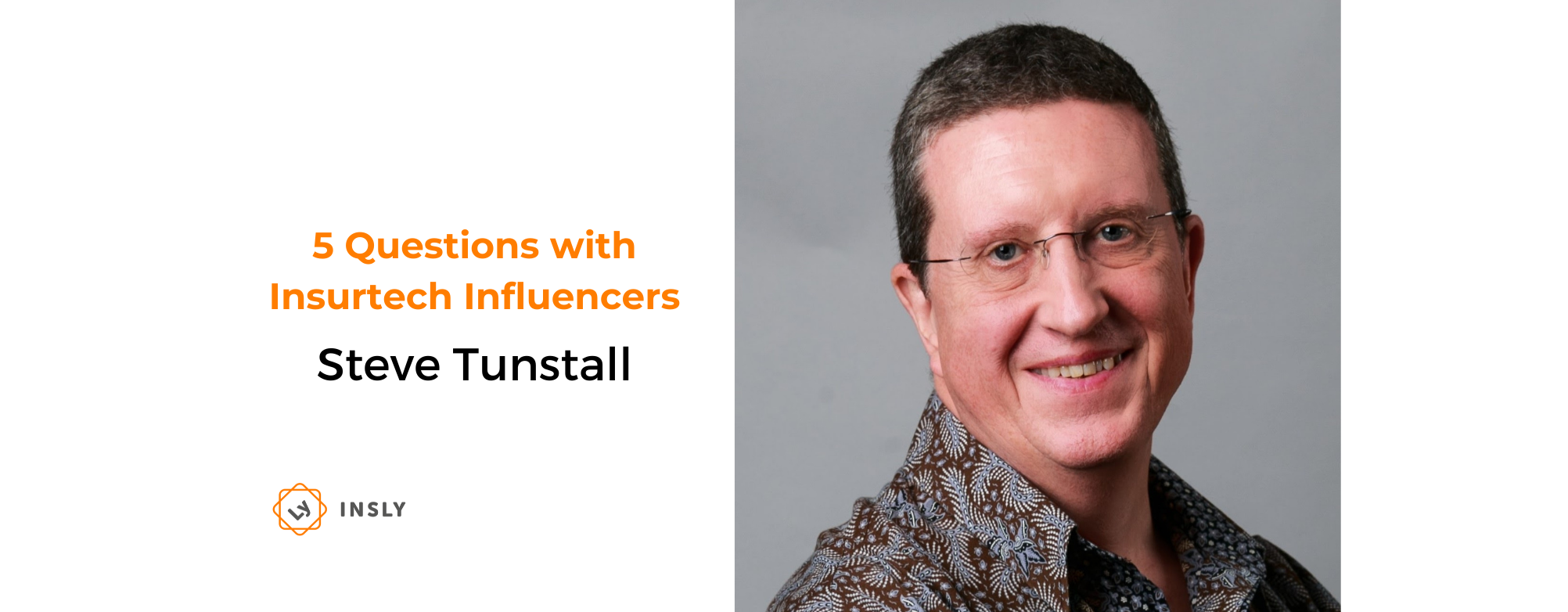This time, Steve Tunstall is sharing his point of view on the insurtech market and trends. His answers bring an interesting SME, corporate insurance, and Asian perspective into the picture.
With 30 years of experience in over 100 countries, Steve has had a colourful career at high-flying jobs in corporate insurance and risk. He is also the Director and Head of Compliance and Risk at Wadzpay, CEO at Inzsure, and Director and General Secretary at PARIMA. At one point, Steve realised the need to give back and contribute to a sustainable future of especially smaller businesses. That has also driven his mission at Inzsure. He claims the biggest challenge for the industry to be finding the appropriate insurance level to genuinely help small companies as an outcome of selling insurance. Take a closer look at what Steve thought of our questions.
1. Can you name three of the most promising insurtech start-ups in 2021? Why would you choose them??
I will look at this from the perspective of SMEs, corporate insurance, and Asia, as these are the angles most connected with what I do. Instead of name-dropping, I would like to take a broader view in answering this question.
- What’s interesting on the corporate insurance side is that we are finally seeing a breakthrough in selling online insurance to corporates. This is where Next Insurance has made a lot of progress in the US market. I believe this to be the key offering for the future.
- More broadly, the biggest theme over the last 12 months in Asia is the movement of delivering insurance to the hands of big tech companies. We are witnessing the emergence of super apps. For example, in Southeast Asia, apps like Grab and Gojek are the new way of life. They started based on the “Uber” model, but now they offer all sorts of services delivered to your door. Both of these super apps also moved into financial services and started selling insurance during last year. That has been the case for some time in China, where apps are already providing insurance and financial services to customers. That has been a significant change and it will be interesting to see its global implications and whether super apps will be successful in other parts of the world. They have been a gamechanger in Southeast Asia.
- Finally, a more personal goal for me and Inzsure this year is to find the right partnerships to make a breakthrough. We want to make a positive impact on SMEs and ensure the sustainability of their business by offering appropriate levels of insurance and make them realise the benefits of insuring.
2. What is the biggest obstacle for insurance start-ups that holds back market disruption and meaningful change?
Unlike North-America and Europe, I would say that the greatest blocker for change and disruption in Asia is the difficulty for start-ups to get funding, unless you are in the right circle. Raising capital for round C or D is easier, since you have already built the business to some extent and solid the results to prove your efforts. But the first kick, seed and round A, is really hard to achieve to get things going. That actually applies to different spaces not only to the insurtech.
Another issue that I have personally experienced is that big incumbents who partner directly with small companies don’t really want to cooperate. Start-ups get a very warm welcome when initially sharing their ideas, they, but incumbents rather like to develop these themselves. Unfortunately, it’s quite typical that after a few years, they fail to deliver internally, spend three times more than it would have cost them, and still haven’t solved the problem.
3. If you were to establish your own insurance start-up, which problem would you solve and why?
For most of my career, I have been a buyer of insurance on behalf of big companies and conglomerates and held positions such as Head of Risk. As part of that journey, I felt that a high-flying job is not everything, I wanted to give back. About eight years ago, I was a part of the team who founded a non-profit organisation Pan-Asia Risk and Insurance Management Association that has nearly 3000 members across 29 countries and does a lot around education and bringing up the level of expertise.
This was good for big companies, but I couldn’t see the same benefits of insurance playing out in small companies. In Asia, the penetration of insurance in small companies is still quite low. For example, a couple of years ago, approximately 97% of companies in Malaysia didn’t buy insurance. Call it a personal disaster for the people involved. These companies are family businesses, employing a few people. But they are in trouble if there happens to be a fire – they’re out of business and can’t feed their families. This is just an aspect of a central issue, but also a reason why I like appropriate levels of insurance. The goal is to protect against exactly these sorts of things and help businesses as a genuine outcome of selling insurance.
Though, the big challenge with policies for small companies is their low cost, around $100-500. This makes it difficult to motivate the traditional intermediary channels to effectively tackle those areas. The average commission is about 20% which makes a commission of just 20 bucks – that’s hardly worth for an agent getting out of bed. The insurance industry has completely failed to address this issue for a long time, but my aspiration is to serve this segment. Technology is the only way we are able to deliver and take this segment on a journey to recognise appropriate levels of insurance. With Inzsure, we haven’t got as far as we wanted to yet, but we are solving the right problem.
4. Which insurtech field will be the most impactful and attract funding in 2021?
That’s a tough call. As I mentioned earlier, the challenge lies in the initial funding – a challenge I have also personally faced. When depending on funding mechanisms that are driven by traditional venture capital values, start-ups tend to overpitch and oversell. VCs expectations are to exit 20x in two or three years, so businesses that meet these needs will get funding.
5. The future of insurance: what makes you hopeful, what worries you?
I’m happy and hopeful about insurance, because I see it as one of the few areas of the financial services industry that is not poisonous. Most areas of banking and associated services are not great for customers, particularly when things go south. Insurance is the opposite – if you have the right level of insurance, it will save you in case of a problem. I’m passionate about this aspect and see a greater cause in that, I see how insurance can make the world a better place.
My main worry is that the insurance industry is based on an intermediary type of model which affects customer relationships. The danger with intermediary experience is that insurers are often outsourcing their branding to others who are not as reliable as they should be. A significant segment of human intermediaries sell insurance for the wrong reasons. This will have a negative impact and customers might perceive insurance as a scam. It takes a few people to have a bad experience for it to really blow up.
Due to this triad model which continues to this day, we get the sense that the insurance industry is still behind other sectors despite of its huge turnover of around $5 trillion a year, which makes it one of the biggest financial sectors. There’s a challenge that the advancement of technology will undermine the basis of the whole industry, because of the inability to change these relationships. As big tech companies move into the insurance sector, they own their customer relationship, they don’t outsource it. I have a concern for intermediaries, because companies who own customer relationships, will come to dominate. It could result in well-known global insurers being just capacity providers which is rather sad.
About
Steve Tunstall is the Director and Head of Compliance and Risk at Wadzpay, CEO at Inzsure, Director and General Secretary at PARIMA, and IIS Ambassador for Pan-Asia.
Steve has global experience in over 100 countries. He has 30 years of experience in being a Board Director, governance, risk, insurance and compliance champion, topped by 15 years of P&L responsibility. Steve has in-depth experience in working with financial and non-financial conglomerates across Asia in risk, insurance, compliance, project, and general management. He is a contributor to an Amazon top-seller “The Insurtech Book”, an author of “RISK and the Asian CEO”, and an invited speaker to over 30 conferences every year.
Follow Steve on LinkedIn and Twitter.
Don’t forget to check out our other insurtech influencer stories with Spiros Margaris, Jan Kastory, Sabine VanderLinden, Ed Halsey, Rick Huckstep, Paolo Cuomo, and Robin Kiera!



